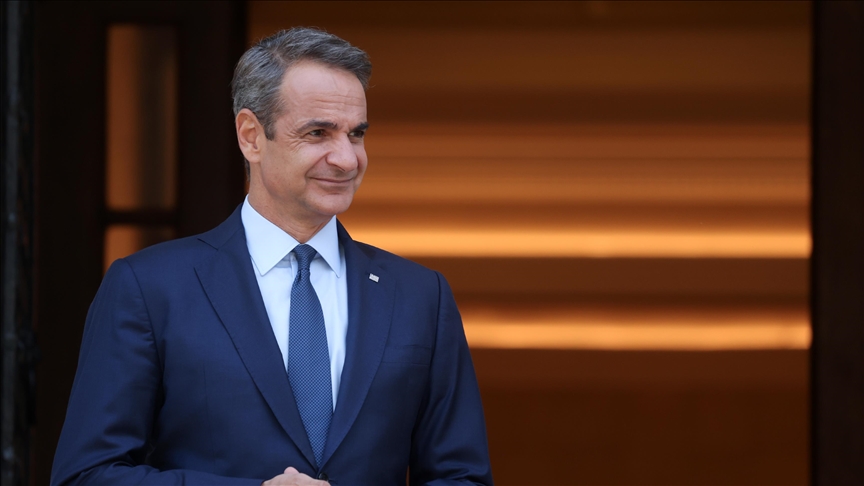Cooperation between Greece and Turkey: A Win-Win Situation
If the Greek side could get rid of the obsession of being the sole owner of the island and abandon her expansionist policy that aims to turn the Aegean Sea into a Greek lake, then there would be a win-win situation for all the stakeholders- The author is the Special Advisor of the Turkish Republic of Northern Cyprus President on International Relations and Diplomacy and Member of the Negotiation Team.
Mitsotakis is the first Greek prime minister to attend the commemorative event in Southern Cyprus at the invitation of Greek Cypriot leader Nikos Christodoulides on the 50th anniversary of the Turkish Peace Operation in Cyprus. How should we read this visit and how it could affect the political landscape on the island?
The presence of Mitsotakis sent messages for the “imagined” Greek hegemony desired to be established in the Eastern Mediterranean and there might be developments in the Cyprus issue in the near future. During his visit to Athens on Dec. 7, 2023, Turkish President Recep Tayyip Erdogan addressed a new era of rapprochement and a positive agenda between the two countries. The signing of the 15 declarations, agreements, and memoranda of cooperation, concerning a wide range of sectors including tourism, energy, trade, education, and transport presented an opportunity for a more constructive dialogue in Turkish-Greek relations.
Having said this, it is really interesting to witness over and over again that every time Türkiye approaches Greece, the Greek side perceived this as an opportunity to impose their political will on the Turkish side. This is followed by a misperception as if the Turkish side will give a compromise to the Greek side on its red lines in the Aegean Sea, on the delimitation of the Eastern Mediterranean maritime jurisdiction areas, and in the Cyprus issue for the sake of improvement of Türkiye-European Union membership process.
Arguably, once more it is this deception that stands behind Mitsotakis’s recent visit to the island. Similarly, the illusion of the Greek Cypriot government that it is the sole legitimate authority of the island under the guise of the legally defunct “Republic of Cyprus” is the creator of the Cyprus problem and the guardian of its existence. Despite their limited demographic, military, and economic powers, the Greek sides followed an expansionist policy in the Eastern Mediterranean, trying to exclude TRNC and Türkiye which has the longest seashore on the Eastern Mediterranean, from the regions political and hydrocarbon equilibrium.
Why is it important for Greece to cooperate with Türkiye? There have been critical developments in the region in recent years. The war in Ukraine and the tragedy in Gaza exacerbate new sources of conflict in this already volatile region. These conflicts also escalated irregular migration which constitutes one of the most significant contemporary security threats for Greece. Especially the war in Ukraine causes political and economic instability all over the world along with endangering the secure transfer of energy resources to Europe.
Greece should cooperate with Türkiye in solving many critical global and regional problems such as irregular migration, international terrorism, safe access to energy resources and so on. Additionally, as put forward by almost all the experts on the issue, the safest and most profitable way for hydrocarbon resources in the Eastern Mediterranean to reach the European market is to transport these sources via Türkiye. In this respect, it is worth reminding that TRNC President Ersin Tatar proposed six constructive proposals for cooperation with the Greek side in July 2022 for the benefit of both nations living on the island. The proposals for cooperation include sharing of the hydrocarbon resources around the island, transition to green energy including the establishment of electricity interconnectivity of the island with the EU grid via Türkiye, and optimizing the utilization of solar energy including investments throughout the island.
Furhter, Turkish President Erdogan proposed a regional East-Med conference on hydrocarbons to sort out the existing political and legal problems with the participation of all the coastal states and stakeholders including the Turkish Cypriot and Greek Cypriot side. If the Greek side could get rid of the obsession of being the sole owner of the island and abandon its expansionist policy that aims to turn the Aegean Sea into a Greek lake, then there will be a win-win situation for all the stakeholders.
Similarly, a fair, realistic, practical, and sustainable solution in Cyprus can only be reached through the existing realities on the island, namely the establishment of a structured cooperative relationship between the two sovereign states. TRNC President Tatar has declared many times that the Turkish side will not invest in a “dead and buried” federal solution model that has yielded no positive results in the past 60 years. This is also a state policy for Türkiye and the Greek side has no power to impose its will on the Turkish side on this issue.
To sum up, Mitsotakis’s visit to Southern Cyprus on July 20 is a fresh new example of the Greek side’s lack of strategic vision on cooperation with Türkiye and the realities on the island. In other words, Mitsotakis once more seems to misunderstand the importance of fostering a stable and cooperative relationship with Türkiye. Turkish side’s preference for diplomacy over unilateralism and dynamic foreign policy based on action will continue to provide the necessary answers to the Greek side that preferred to rely on rhetoric, help from the outside actors, and vicious circle diplomacy for many years.
*Opinions expressed in this article are the author’s own and do not necessarily reflect the editorial policy of Anadolu.
Anadolu Agency website contains only a portion of the news stories offered to subscribers in the AA News Broadcasting System (HAS), and in summarized form. Please contact us for subscription options.

